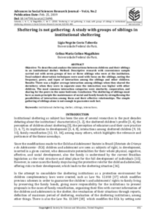Displaying 41 - 50 of 84
There is extensive research demonstrating clearly the importance of a safe and caring family for child wellbeing and development. While there is consensus on the importance of effective care in families for children, there is a lack of discussion and agreement about the precise components of this care. This report contributes to debates on the components of family care by providing perspectives from nearly 200 children and over 80 adults from Brazil, Colombia, Egypt, Mexico, Russia, Rwanda and Zimbabwe. The report demonstrates that there are many commonalities in perspectives on and experiences of care across contexts.
El Seminario de RELAF tiene como fin fortalecer los procesos de desinstitucionalización mencionados e impulsar otros semejantes en el resto de los países.
Family for Every Child would like to invite you to an Online Event to discuss models and systems for Kinship Care in Brazil. Pre-recorded presentations from three different speakers will be released on Wednesday 27 March. One week later on Wednesday 3 April at 13:00 UK time, they will host a live Q&A panel discussion with the featured presenters.
This is the 3rd and final presentation in the Kinship Care in Brazil mini-series. Here, Claudia Cabral of Associação Brasileira Terra dos Homens describes the importance of considering the extended family when making decisions about children’s care, and efforts to advocate to the Brazilian government.
This is the 2nd presentation in the Kinship Care in Brazil mini-series. Here, Jonathan Hannay of ACER Brazil, shares learning from a programme of formal therapeutics kinship care that draws upon the Breaking the Cycle approach. Correction: The number stated at 17:02 should be 4, not 17.
This is the 1st presentation in our Kinship Care in Brazil mini-series. Here, Ana Angélica Campelo of Brazil’s Ministry of Citizenship, shares an overview of the social welfare system in Brazil and how kinship care fits within it.
Family for Every Child has shared three pre-recorded presentations to watch in advance of their Online Event on Kinship Care in Brazil on Wednesday 3 April at 13:00 UK time.
The purpose of this paper is to describe and analyze the interactions between children and their siblings in an institutional shelter in Brazil.
This article from Reuters calls attention to the large numbers of indigenous children growing up in care in Brazil, particularly in the southwestern state of Mato Grosso do Sul.
The current longitudinal study examined the prevalence, overlap, and impact of adverse childhood experiences (ACEs) in a sample of Brazilian children and adolescents who use city streets as spaces for socialization and survival (i.e., street-involved youth).


